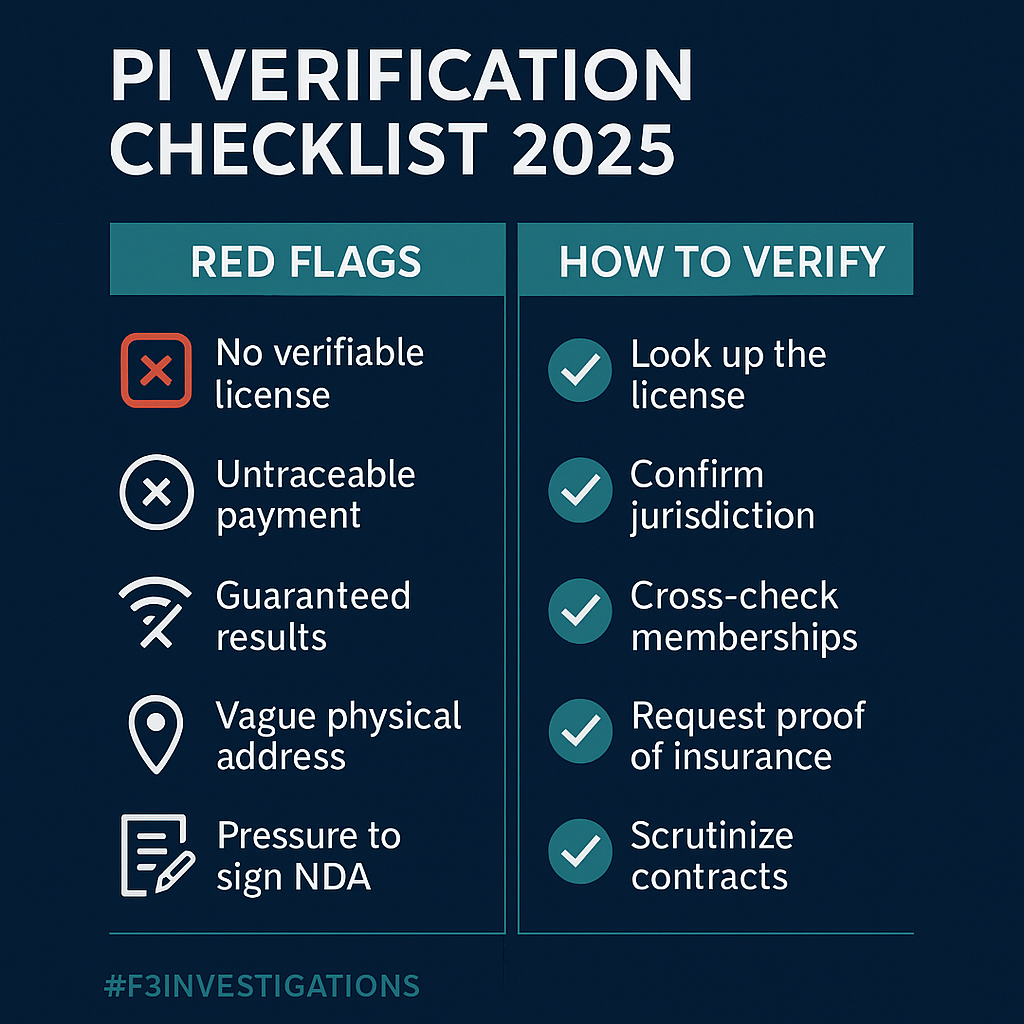The private-investigation industry thrives on trust, but grifters are working just as hard to exploit it. The FTC logged a 37 % jump in fraud reports tied to bogus investigative services last year [1]. Some scammers scrape real investigators’ license numbers, generate AI head-shots, and spin up look-alike sites that vanish after a few retainers. Others pose as “ex-intelligence operatives” on social media, promising miracles for cash up front. If you—or your firm—need investigative help in 2025, here’s how to separate seasoned pros from digital impostors.
Anatomy of a Scam: The “Ex-Agent” on Instagram
A small-business owner needed to vet a prospective partner and found an “ex-federal agent” on Instagram with a slick profile and loads of tactical-gear photos. The PI quoted a bargain price and demanded a $5 000 retainer in cryptocurrency for an expedited check. Hours after payment, the profile vanished. A quick license lookup showed the number belonged to a legitimate, retired PI in another state—identity stolen, reputation hijacked. The business owner lost money and precious deal-making time.
Why PI Scams Are Booming
- Low barrier to entry: $20 buys a convincing badge on the dark web; free templates mimic legitimate agencies overnight.
- AI fakery: Deep-fake video résumés and voice clones “prove” experience scammers never earned [6].
- Remote engagement: Many clients hire investigators they never meet, making license checks easy to skip.
Red Flags You Shouldn’t Ignore
 • No verifiable license—or a number valid in a different state than the work.
• No verifiable license—or a number valid in a different state than the work.
• Only untraceable payment (crypto, gift cards, cash wire).
• Guaranteed results (real PIs guarantee effort, not outcomes).
• Vague physical address (just a P.O. box) and disposable e-mail.
• Pressure to sign an NDA before they reveal credentials.
How to Verify a PI in 2025
- Look up the license. Use the issuing state’s public registry; most offer instant online verification [5].
- Confirm Jurisdictional Competence. A Texas license doesn’t grant authority in California. Pros disclose limits and, if needed, partner with locally licensed firms—ensuring they know local laws and have the right regional databases.
- Cross-check professional memberships. Reputable firms appear in NCISS or ASIS International directories [2][3].
- Request proof of insurance. Legitimate agencies carry errors-and-omissions and general liability coverage.
- Inspect the digital footprint. Reverse-image-search staff photos; look for a consistent history on LinkedIn, state-association listings, and court records.
- Scrutinize contracts. A proper retainer spells out scope, fees, jurisdiction, and data-protection measures—no blanks, no handshake deals.
Our Five-Step Due-Diligence Promise
- License packet—numbers, issuing dates, and links to each state’s lookup.
- Insurance certificate—COI included in every proposal.
- Association transparency—NCISS, ASIS, state PI memberships, all current.
- Secure client portal—encrypted uploads, hash-stamped deliverables, never generic e-mail.
- Third-party references—law firms and corporations happy to vouch for our work.
Gauging the Pro: Does Your Investigator Pass the Character Test?
Credentials are table stakes; professionalism seals the deal. A seasoned PI explains methodology and legal boundaries without hedging. They answer “why” as readily as “how,” set realistic timelines, and don’t panic when you probe their process. If an investigator dodges these questions, keep shopping.
Falling for a PI scam can derail litigation, sabotage corporate strategy, or endanger personal safety. Verifying credentials takes minutes; unwinding fraud can take years. If you’re unsure where to start, call us. We’ll walk you through our credentials—and show you how to check anyone else’s.
Reference List
- Federal Trade Commission. Consumer Sentinel Network Data Book 2024. https://www.ftc.gov
- National Council of Investigation & Security Services. Membership Directory 2025. https://www.nciss.org
- ASIS International. Professional Investigator Standard & Guideline 2023. https://www.asisonline.org
- Better Business Bureau. Investigative Services Scam Tracker Report 2024. https://www.bbb.org
- California Bureau of Security & Investigative Services. License Lookup Tool (accessed 2025). https://www.bsis.ca.gov
- Cybersecurity & Infrastructure Security Agency. Deepfake Threats to Small Business and Consumers 2025. https://www.cisa.gov